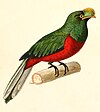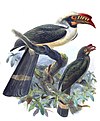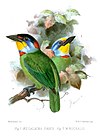Trogon (genus)
| Trogon | |
|---|---|

| |
| Elegant trogon (Trogon elegans) | |
| Scientific classification | |
| Domain: | Eukaryota |
| Kingdom: | Animalia |
| Phylum: | Chordata |
| Class: | Aves |
| Order: | Trogoniformes |
| Family: | Trogonidae |
| Genus: | Trogon Brisson, 1760 |
| Type species | |
| Trogon viridis Linnaeus, 1766 | |
| Species | |
|
See text. | |
Trogon is a genus of Coraciimorphae birds in the trogon family. Its members occur in forests and woodlands of the Americas, ranging from southeastern Arizona to northern Argentina.
They have large eyes, stout hooked bills, short wings, and long, squared-off, strongly graduated tails; black and white tail-feather markings form distinctive patterns on the underside. Males have richly colored metallic plumage, metallic on the upperparts.[1] Although many have brightly coloured bare eye-rings, they lack the colorful patches of bare facial skin in their African counterparts, Apaloderma.[2] Females and young are duller and sometimes hard to identify in the field.[1] Eggs are white or bluish-white, unlike the pale blue eggs of quetzals.[2] See the family account for further details.
Taxonomy
The genus Trogon was introduced by the French zoologist Mathurin Jacques Brisson in 1760 with the green-backed trogon (Trogon viridis) as the type species.[3][4] The name of the genus is from the Ancient Greek τρωγων trōgōn for "fruit-eating" or "gnawing".[5] The name had previously been used by the German naturalist Paul Möhring in 1752 for the blue-crowned trogon (Trogon curucui).[6]
The following cladogram shows the relationships between the 20 species placed in the genus. It is based on a molecular phylogenetic study by Jeffrey Dacosta and John Klicka that was published in 2008.[7] The cladogram incorporates the species splits that resulted from this study.[8]
| Trogon |
| ||||||||||||||||||||||||||||||||||||||||||||||||||||||||||||||||||||||||||||||||||||||||||||||||||||||||||||||||||
Certain plumage features map onto the phylogeny. In Clade A the females are brown-backed while in the other two clades females are gray-backed. The males in Clade A are all green-headed. In Clade B the males are green-headed and have mostly dark undertail patterns. In Clade C males are blue- or black-headed and have white or contrasting black-and-white undertail patterns. The belly color does not map onto the phylogeny. For example, in Clade C Baird's trogon is red-bellied while the white-tailed trogon is yellow-bellied. Similarly, the blue-crowned trogon is red-bellied while the Guianan trogon is yellow-bellied.[7]
Species
The 20 species now recognised in the genus are:[8]
| Male | Female | Scientific name | Common Name | Distribution |
|---|---|---|---|---|
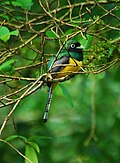 |
 |
Black-throated trogon or Yellow-bellied Trogon | Trogon rufus | Honduras south to western Ecuador and northern Argentina |
 |
 |
Elegant trogon | Trogon elegans | Guatemala in the south as far north as the upper Gila River in Arizona and New Mexico |
 |
 |
Mountain trogon | Trogon mexicanus | Guatemala, Honduras, and Mexico and has occurred in El Salvador |
 |
Collared trogon | Trogon collaris | northern Colombia, northern Venezuela and Trinidad and Tobago | |
 |
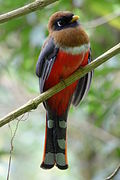 |
Masked trogon | Trogon personatus | the Andes |
 |
 |
Lattice-tailed trogon | Trogon clathratus | Costa Rica and Panama |
 |
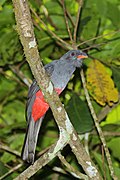 |
Slaty-tailed trogon | Trogon massena | southeastern Mexico south through Central America, to Colombia, and a small region of northwestern Ecuador |
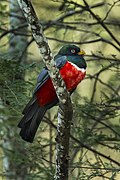 |
Ecuadorian trogon | Trogon mesurus (split from T. melanurus) | western Ecuador and far north-western Peru | |
 |
Chocó trogon | Trogon comptus | western Colombia and north-western Ecuador. | |
 |
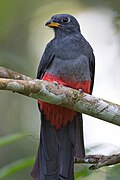 |
Black-tailed trogon | Trogon melanurus | north-western South America and adjacent Panama |
 |
Citreoline trogon | Trogon citreolus | western Mexico | |
 |
 |
Black-headed trogon | Trogon melanocephalus | northern Colombia, northern Venezuela and Trinidad and Tobago |
 |
 |
Green-backed trogon | Trogon viridis | the Amazon, the Guiana Shield, Trinidad, and the Atlantic Forest in eastern Brazil |
 |
 |
Baird's trogon | Trogon bairdii | Costa Rica and far western Panama |
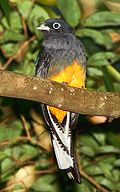 |
White-tailed trogon | Trogon chionurus (split from T. viridis) | Chocó, ranging from Panama, through western Colombia, to western Ecuador | |
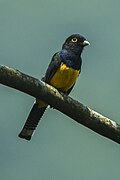 |
 |
Gartered trogon | Trogon caligatus (split from T. violaceus) | east-central Mexico, south through Central America, to west or north of the Andes in Colombia, Ecuador and Venezuela |
| Amazonian trogon | Trogon ramonianus (split from T. violaceus) | the Amazon | ||
 |
 |
Surucua trogon | Trogon surrucura | south-eastern Brazil, eastern Paraguay, and far north-eastern Argentina and Uruguay |
 |
Guianan trogon | Trogon violaceus | Mexico, Central America, and northern South America | |
 |
Blue-crowned trogon | Trogon curucui | Argentina, Bolivia, Brazil, Colombia, Ecuador, Paraguay, and Peru |
References
- ^ a b Hilty, Steven L. (2003), Birds of Venezuela, Princeton University Press, p. 438, ISBN 0-691-09250-8
- ^ a b Williamson, Sheri L.; Colston, P. R. (2003), "Trogons", in Christopher Perrins (ed.), Firefly Encyclopedia of Birds, Firefly Books, pp. 362–363, ISBN 1-55297-777-3
- ^ Brisson, Mathurin Jacques (1760). Ornithologie, ou, Méthode Contenant la Division des Oiseaux en Ordres, Sections, Genres, Especes & leurs Variétés (in French and Latin). Paris: Jean-Baptiste Bauche. Vol. 1, p. 42, Vol. 4, p. 164.
- ^ Dickinson, E.C.; Remsen, J.V. Jr., eds. (2013). The Howard & Moore Complete Checklist of the Birds of the World. Vol. 1: Non-passerines (4th ed.). Eastbourne, UK: Aves Press. p. 280. ISBN 978-0-9568611-0-8.
- ^ Jobling, J.A. (2019). del Hoyo, J.; Elliott, A.; Sargatal, J.; Christie, D.A.; de Juana, E. (eds.). "Key to Scientific Names in Ornithology". Handbook of the Birds of the World Alive. Lynx Edicions. Retrieved 9 April 2019.
- ^ Möhring, Paul Heinrich Gerhard (1752). Avium Genera (in Latin). Avricae: apvd G.G. Rvmp. p. 85, No. 114.
- ^ a b Dacosta, Jeffrey M.; Klicka, John (2008). "The great American interchange in birds: a phylogenetic perspective with the genus Trogon". Molecular Ecology. 17 (5): 1328–1343. Bibcode:2008MolEc..17.1328D. doi:10.1111/j.1365-294X.2007.03647.x. PMID 18302692. S2CID 25090736.
- ^ a b Gill, Frank; Donsker, David, eds. (2019). "Mousebirds, trogons, Cuckoo Roller". World Bird List Version 9.1. International Ornithologists' Union. Retrieved 7 April 2019.

